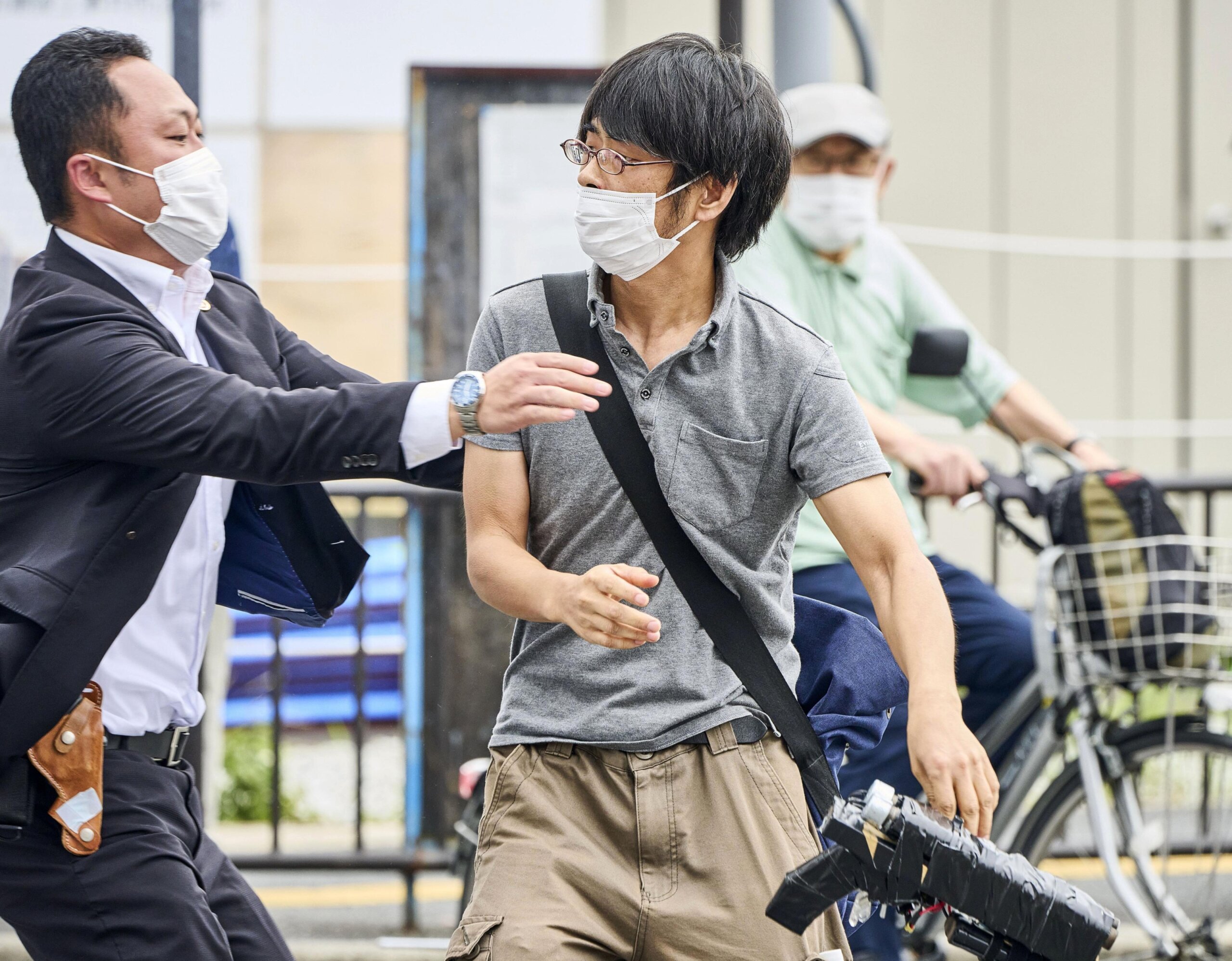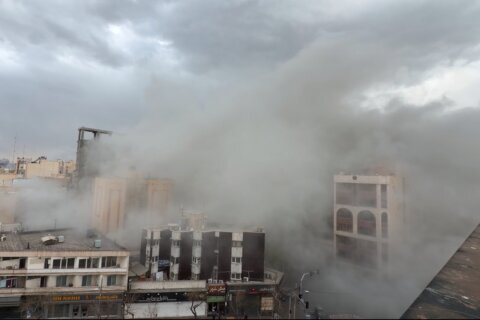On July 8 at 11:30 a.m. local time, Japan’s former Prime Minister Shinzo Abe stood atop a small red, 2-foot-tall platform. It was 3 feet long and positioned in the middle of a busy street. He was protected by a trapezoid-shaped arrangement of guardrails and a handful of visible bodyguards.
Dressed in a dark suit and a white open-collar shirt, he held a microphone in his right hand and gestured with his left hand, which was clenched into a fist. He was delivering an impassioned speech outside of the Yamato-Saidaiji Railway Station in Nara, Japan.
Suddenly, Abe froze for three seconds after a thunderous explosion and white smoke erupted behind him. He turned and looked over his left shoulder. Another blast echoed.
At that moment his open collared, shirt fluttered near his neck. A small red spot appeared on his collar. Smoke, again, curled into the air.
Abe, his body jarred, by the force of the blast, turned back to the audience, stepped off the platform, fell to one knee and then collapsed to the ground.
He’d been gravely wounded by bullets from what resembled a homemade, sawed-off shotgun. Almost six hours later, he died.
So did the idea that public figures — even heavily protected ones — are safe in today’s world.

‘It’s a new day’
“You can no longer take anything for granted,” said a federal law enforcement source who is responsible for protecting U.S. officials, foreign politicians and diplomats.
The confluence of do-it-yourself tutorials on the internet, surging global violence, and the increasing willingness of people to use violence to address grievances has created a new challenge for organizations that protect politicians.
In a report released July 11 to commemorate World Population Day, the United Nations expressed concerns over festering challenges, one of which is violence.
“In an ideal world, eight billion people means eight billion opportunities for healthier societies empowered by rights and choices. But the playing field is not and has never been, even,” the report reads.
Inequities impacting gender, ethnicity, class, religion, sexual orientation and even basic necessities, such as food and water, are sweeping the globe. Anecdotal evidence indicates frustrated victims of these inequities are turning to violence as a remedy.
Often, public officials like Abe, are targeted.
Tetsuya Yamagami, 41, the man who killed him reportedly was upset because his mother went bankrupt after making large donations to a religious organization with which Abe was associated. He told Japanese authorities he built the gun using tutorials on YouTube.
“It’s a new day,” said A.T. Smith, former deputy director of the Secret Service.
“Abe’s assassination,” he said, is “a lesson learned” and will motivate international protective agencies, “to be a lot more vigilant.”
Condolences poured into Japan’s government from world leaders. Many of them, like President Joe Biden, expressed shock. The murder was particularly stunning because Japan is one of the world’s safest countries. Guns there are strictly controlled.
Japan, according to the latest figures available, has a firearm death rate of just 0.01 per 100,000 people. There were 10 reported cases of shootings in 2021. The country’s population is 127 million.
In the U.S., however, it’s a different story.
‘I don’t think anyone is safe’
There have been 356 mass shootings in the U.S. since January, according to the Gun Violence Archive. More than 11,000 people have been killed.
“The volatile atmosphere and how passionate people have become about issues important to them, should be of deep concern to protective agencies,” Smith said.
Some of the people they protect are experiencing unsettling incidents.
An armed man was arrested outside the Seattle home of Rep. Pramila Jayapal, D-Wash., on July 14. When police arrived, after being called, they found a 48-year-old man with a holstered .40-caliber Glock 22 handgun. Jayapal, who has protective resources because of her work in Congress, was home at the time of the incident.
But as worrisome as that is, there is a far more dangerous concern unfolding here in the U.S. — it’s state and local politicians who have no security details.
“It’s extremely concerning,” said Brian Anleu, a candidate for a seat on the county council in Montgomery County, Maryland. “Given the high rates of gun ownership, and the increasing polarization in this country, I don’t think anyone is safe.”
The American Psychological Association said in a 2013 report that “there is no single profile that can reliably predict who will use a gun in a violent act. Instead, gun violence is associated with a confluence of individual, family, school, peer, community and sociocultural risk factors that interact over time during childhood and adolescence.”
Numerous studies, including several by the U.S. Secret Service, suggest little has changed in the ensuing years.
Considering 2022 is an election year across the U.S., the Abe assassination, according Smith, has likely generated close scrutiny by the Secret Service.
“Anytime there is an assassination attempt, anywhere in the world, either the folks in the training division or intelligence section of the Secret Service will dissect it and make their own assessment as to what went wrong and what could be improved.”
As far as protective details are concerned, Smith said, “It’s volatile, right now. Protective details have to be ever-vigilant; now more than ever, always being careful of their surroundings; and from time to time you do have to tell protectees, it’s just not safe to go into that particular environment.”
For Anleu, who has no security detail, it’s about making sure he’s doing all he can to protect himself.
“For me, it’s about trying not to be inflammatory,” he said. “Even at the local level, when you’re running for office of any kind, there’s an inclination to sometimes draw sharp distinctions between yourself and other candidates and possibly commenting on national issues like Roe v. Wade, for example. It’s very easy to be inflammatory and say things that can strike a nerve with people.”
Anleu added: “For me, a candidate with two young children, I think it’s about being a little bit more measured, both on social media and while I’m out campaigning.”








